423. The beginning of the C text was probably
where Sirrah (0h) was at the Full Moon, viz. in
September 20 (263 = 80 + 183), and counting 384 glyphs
ahead will bring us to day 263 + 384 - 365 = 282, i.e.
to right ascension day *202 where at the time of
rongorongo Spica rose with the Sun in October 9 (282):
|
no glyph |
 |
 |
 |
 |
 |
 |
|
Ca1-1 |
Ca1-2 |
Ca1-3 |
Ca1-4 |
Ca1-5 |
Ca1-6 |
|
Sept 20 |
21 (264) |
Equinox |
23 |
24 (☼183) |
25 (*5 + *183) |
26 (☼185) |
|
"Aug 10 (222) |
11 |
12 (265 - 41) |
13 (15 * 15) |
14 |
(227 = 268 - 41) |
16 (*148) |
|
CLOSE TO THE SUN: |
|
ALCHITA = α Corvi, MA WEI (Tail of the
Horse) = δ Centauri
(183.1),
MINKAR = ε Corvi
(183.7), ρ Centauri (183.9) |
PÁLIDA (Pale) =
δ
Crucis
(184.6),
MEGREZ (Root of the Tail) =
δ
Ursae Majoris
(184.9) |
Hasta-13 (Hand) /
Chariot-28 (Worm)
GIENAH (Wing) =
γ
Corvi
(185.1),
ε
Muscae (185.2),
ζ
Crucis (185.4),
ZANIAH (Corner) =
η
Virginis
(185.9)
*144.0 = *185.4 - *41.4 |
CHANG SHA (Long Sand-bank) =
ζ
Corvi
(186.3) |
INTROMETIDA (Inserted) =
ε
Crucis
(187.4),
ACRUX =
α
Crucis
(187.5)
*146.0 = *187.4 - *41.4 |
γ
Com. Berenicis (188.0),
σ
Centauri (188.1),
ALGORAB =
δ
Corvi
(188.5),
GACRUX =
γ
Crucis
(188.7) |
γ
Muscae (189.0),
AVIS SATYRA (Bird of the
Satyrs) =
η
Corvi
(189.3),
ASTERION (Starry) =
β
Canum Ven.
(189.5),
KRAZ = β Corvi,
κ Draconis (189.7) |

... Raven gazed up and down the beach. It
was pretty, but lifeless. There was no one
about to upset, or play tricks upon. Raven
sighed. He crossed his wings behind him and
strutted up and down the sand, his shiny
head cocked, his sharp eyes and ears alert
for any unusual sight or sound. The
mountains and the sea, the sky now ablaze
with the sun by day and the moon and stars
he had placed there, it was all pretty, but
lifeless. Finally Raven cried out to the
empty sky with a loud exasperated cry. And
before the echoes of his cry faded from the
shore, he heard a muffled squeak. He looked
up and down the beach for its source and saw
nothing. He strutted back and and forth,
once, twice, three times and still saw
nothing. Then he spied a flash of white in
the sand. There, half buried in the sand was
a giant clamshell. As his shadow fell upon
it, he heard another muffled squeak. Peering
down into the opening between the halves of
the shell, he saw it was full of tiny
creatures, cowering in fear at his shadow
... |
|
CLOSE TO
THE FULL MOON: |
|
Al Fargh al Thāni-25 (Rear Spout)
0h (365.25)
CAPH (Hand) =
β
Cassiopeiae,
SIRRAH (Navel of the Horse) =
α
Andromedae
(0.5),
ε
Phoenicis,
γ³
Oct.
(0.8) |
Uttara Bhādrapadā-27 (2nd of the Blessed
Feet) /
Wall-14 (Porcupine)
ο Oct. (1.3),
ALGENIB PEGASI = γ Pegasi
(1.8) |
χ Pegasi (2.1), θ Andromedae (2.7) |
σ Andromedae (3.0), ι Ceti (3.3), ζ Tucanae
(3.5), ρ Andromedae, π Tucanae (3.7) |
no star listed (4) |
ANKAA = α Phoenicis,
κ Phoenicis (5.0)
ALPHARD (α Hydrae)
|
λ Phoenicis (6.3), β Tucanae (6.4) |
|
374 |
 |
 |
 |
 |
 |
 |
|
*Ca14-18 |
*Ca14-19 |
*Ca14-20 (383) |
(6 + 378) |
*Ca14-22 |
*Ca14-23 |
|
CLOSE TO THE SUN: |
|
(461 - 182 = 279) |
7 |
8 (281) |
Oct
9 |
10 |
11 (284) |
|
AL DAFĪRAH (Tuft) = β Com. Ber.
(199.4) |
σ Virginis (200.4)
*159.0 = *200.4 - *41.4 |
γ Hydrae (201.0), ι Centauri (201.4) |
Al Simāk-12 (Lofty) /
Chitra-14 (Bright One) /
Horn-1 (Crocodile) /
Sa-Sha-Shirū-20
(Virgin's Girdle) /
ANA-ROTO-3 (Middle pillar)
MIZAR =
ζ
Ursae Majoris (202.4), SPICA =
α
Virginis, ALCOR = 80 Ursae Majoris
(202.7)
SADALMELIK (α Aquarii)
*161.0 = *202.4 - 41.4 |
71 VIRGINIS
(203.6) |
no star listed (204) |
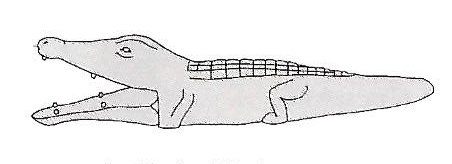 |
|
CLOSE TO
THE FULL MOON: |
|
(86 + 375 = 461) |
(462 - 366 = 96) |
April 7 |
8 (464) |
9 |
10 (100) |
|
1h (15.2)
β Phoenicis (15.1), υ Phoenicis, ι Tucanae
(15.6), η Ceti, ζ Phoenicis (15.7) |
Al Batn Al Hūt-26 (Belly of the Fish) /
Revati-28 (Prosperous) /
1-iku (Field Measure)
MIRACH (Girdle) = β Andromedae, KEUN MAN MUN
(Camp's South Gate) = φ Andromedae
(16.0),
ANUNITUM = τ Piscium
(16.5),
REVATI (Abundant) = ζ Piscium
(16.9)
REGULUS
(α Leonis) |
ν Phoenicis (17.4), κ Tucanae (17.6) |
no star listed (18) |
ADHIL (Garment's Train) = ξ Andromedae
(19.3), θ Ceti (19.7) |
KSORA (Knee) = δ Cassiopeiae
(20.1), ω Andromedae (20.6), γ Phoenicis
(20.8) |
|
... Though Andromeda has its roots most
firmly in the Greek tradition, a female
figure in Andromeda's place appeared in
Babylonian astronomy. The stars that make up
Pisces and the middle portion of modern
Andromeda formed a constellation
representing a fertility goddess, sometimes
named as Anunitum or the Lady of the
Heavens ...
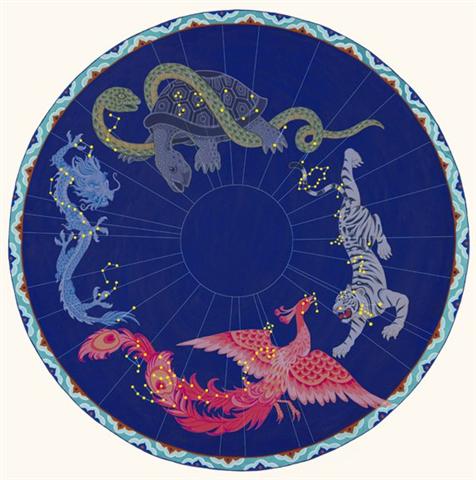 |
 |
 |
 |
 |
 |
 |
|
*Ca14-24 |
*Ca14-25 |
*Ca14-26 |
*Ca14-27 |
*Ca14-28 |
*Ca14-29 (392) |
|
CLOSE TO THE SUN: |
|
Oct 12 |
13 |
14 |
15 (288 =
☼204) |
16 |
17 (392 + 80 - 182) |
|
HEZE =
ζ
Virginis
(205.0),
Southern Pinwheel Galaxy = M83 Hydrae
(205.7) |
ε Centauri (206.3), κ Oct. (206.4) |
no star listed (207) |
τ
Bootis (208.2),
BENETNASH (Leader of the Daughters of the
Bier) =
η
Ursae Majoris
(208.5),
ν
Centauri (208.7),
μ
Centauri,
υ
Bootis (208.8) |
no star listed (209) |
MUPHRID (Solitary Star) = η Bootis
(210.1), ζ Centauri (210.3) |
|
CLOSE TO
THE FULL MOON: |
|
April 11 |
12 |
13 |
14 (104 =
☼20) |
15 |
16 (392 - 366 + 80) |
|
δ Phoenicis (21.5) |
υ Andromedae (22.9) |
ACHERNAR (End of the River) = α Eridani
(23.3), χ Andromedae (23.6), τ Andromedae
(23.9) |
ALSEIPH (Scimitar) = φ Persei
(24.5), τ Ceti (24.7) |
no star listed (25) |
ANA-NIA-10 (Pillar-to-fish by)
χ
Ceti (26.1),
POLARIS = α Ursae Minoris, BATEN KAITOS
(Belly of the Fish) = ζ
Ceti
(26.6),
METALLAH = α Trianguli
(26.9) |
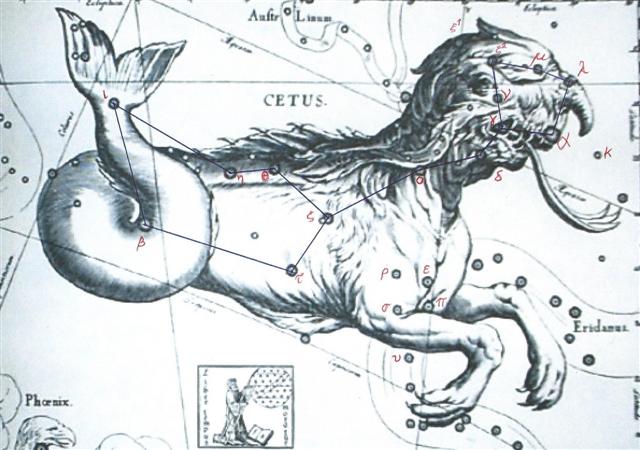 |
From Sirrah (The Navel of the Horse)
to Corvus and the Tail of the Horse (Ma Wei, δ
Centauri) in September 20 there were 183 right
ascension days, but from Spica in October 9 (282) to
day 98 (April 8) there were only 464 - 282 = 182
days; 183 + 182 = 365.
The Babylonian zodiac had a Mercury
sign
...
Mercury could be observed only in the east or in the
west - i.e. close to Mother Earth
...
... Ganz ähnlich is
der Name 'Gott von Duazag' des Gottes Nabū
... zu erklären.
Er
bezeichnet ihn als den Gott des Wachtstums, welches
als aus dem Osten stammend betrachtet wird, weil die
Sonne, die das Wachstum bringt, im Osten aufgeht.
Dass aber
Nabū als Ost-Gott aufgefasst wurde, hängt damit
zusammen, dass sein Stern, der Mercur, nur im Osten
oder Westen sichtbar ist ...
between Furrow and Frond and this double sign
had been carried forward through time, visualizing how
growth (Wachstum) was defined by not only birth but also by death:
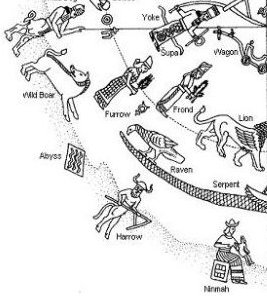

At the time of Bharani the right
ascension day of Spica was *161 (= *202.4 - *41.4),
which ought to remind us of day 161 = June 10:
... The month, which takes its name from Juppiter
the oak-god, begins on June 10th and ends of July
7th. Midway comes St. John's Day, June 24th, the day
on which the oak-king was sacrificially burned
alive. The Celtic year was divided into two halves
with the second half beginning in July, apparently
after a seven-day wake, or funeral feast, in the
oak-king's honour ...
Assuming we should move ahead in the
C text, from "June 10 (*161) at heliacal Spica to
the day when the king was
sacrificially burned alive, in
"June 24 (*175), we will arrive at the extraordinary
glyph Gb1-6 (398 = 384 + 14):

Virgo was the very first
constellation in the zodiac:
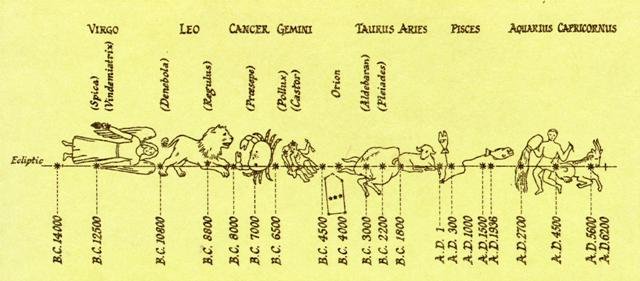
*41.4 + *80 = *121.4 and 121.4 /
365.25 * 26000 was 8642 years before the time of
rongorongo. 8642 - 1842 AD = 6800 BC, when the
northern vernal equinox had been in Cancer.
12500 BC (cfr the illustration above) - 6800 BC =
5700 years corresponds to 5700 / 26000 *
365.25 = 80 right ascension days, which means that
in the age of Cancer (6800 BC) the thong which held
it all together would have been around June 9 (80 +
80).
...
Proclus informs us that the fox star nibbles
continuously at the thong of the yoke which holds
together heaven and earth; German folklore adds that
when the fox succeeds, the world will come to its
end. This fox star is no other than Alcor,
the small star g near zeta Ursae Majoris (in India
Arundati, the common wife of
the Seven Rishis, alpha-eta Ursae) ...

|

















